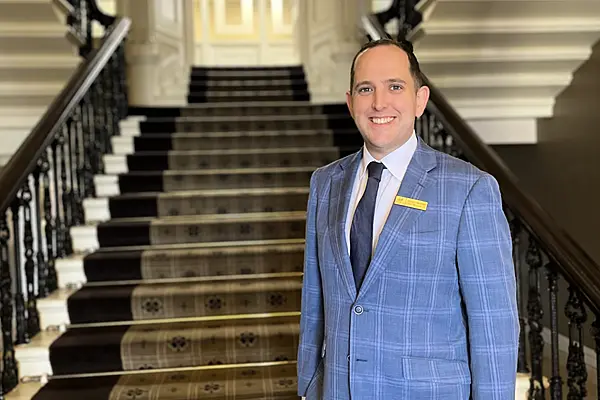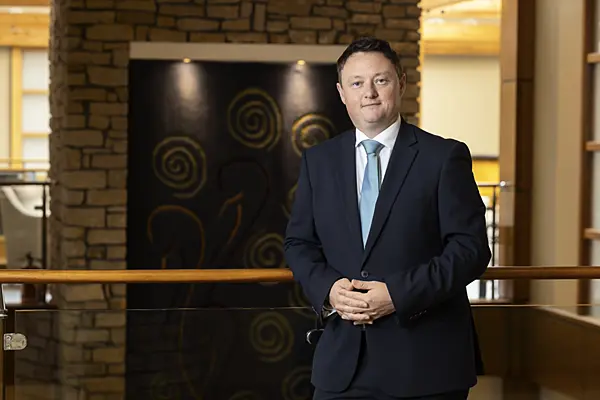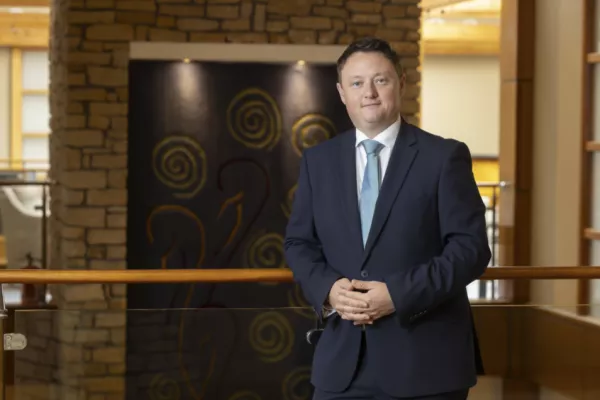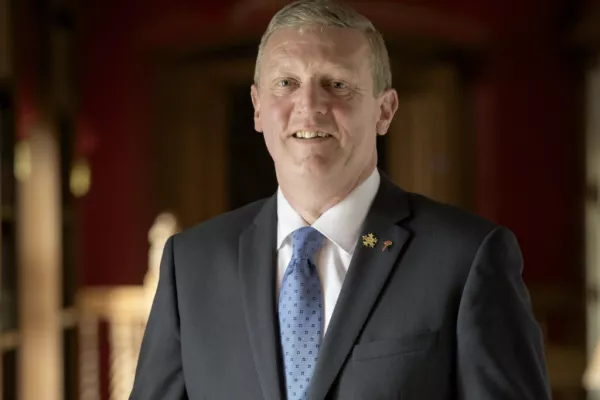The Royal Marine Hotel was first built in 1863, but its history dates back to 1828, when a property known as Hayes’ Hotel stood on the site overlooking Dublin Bay.
The newly developed Royal Marine Hotel first opened its doors in 1865, and it has become an important part of Irish history ever since, welcoming presidents, royalty and celebrities.
Queen Victoria once enjoyed a 16-course breakfast in the hotel shortly after arriving in Dun Laoghaire. Frank Sinatra, Laurel and Hardy, and Charlie Chaplin were all known to have walked through its doors, while Michael Collins was rumoured to have hidden out in Room 210 with his partner, Kitty Kiernan, while evading the British Army.
The four-star hotel is independently owned and operated by the Neville family, from Co. Wexford, who purchased the hotel in 2003 and completed a renovation and restoration programme.
The family has managed the delicate balance of respecting the hotel’s beautiful classical design while incorporating modern influences.
Colin Brown has been with the establishment since 2022 and was appointed general manager last year.
Colin, please tell me a little bit about your own background – where you grew up and studied.
My first job in hospitality was the Graduate Bar and Restaurant in Killiney. I was just a lounge boy walking around at 15, trying to get a job.
I have never thought of anything else, other than hospitality. As a lounge boy, talking to individuals, seeing drama develop, seeing people’s reactions to different moments in life – they all happen in these social settings. The good, the bad. Two days are never the same. That’s what I love about hospitality.
I worked for the Graduate for two and a half to maybe three years before moving to Baker’s Corner. This was Sixth Year, and I remember driving to Bewley’s Hotel to do an interview for Shannon College.
The Gardaí were doing interviews on the same day in the RDS, and I was between the two! Those were my choices, but hospitality was for me. Once I met the actual lecturers and did the interviews, I knew I had made the right choice.
It could be said that both jobs can have high levels of stress.
Both jobs involve problem-solving, but one is probably a little less strenuous than the other. People usually arrive to a hotel in good form, and you can make it bad. It’s their experience inside the property that turns it into a good experience or a bad experience.
A warm welcome on arrival is so important. It’s great to watch the guests’ eyes light up as you explain the area and what’s going on.
To attend Shannon, I had to move away from Dublin, and, again, I wondered if I had made the right choice or not. However, once I got down there, it was phenomenal – such a great life experience. Shannon teaches you to be an individual. You grow up faster. Those memories still last with me.
The daunting thing about being a manager is, if you can’t manage yourself, how can you expect to manage other people? Time-keeping, presentation – that was drilled into us at Shannon, right from Day One. You pick up skill sets that stand the test of time.
What you present to the team is what they will reflect back, so positivity is very important. There is always opportunity in hospitality – that’s the great thing about it.
Getting back to Shannon – I went on to Second Year and loved it. There are some fantastic lecturers there, some great inspiration. I remember Sean T. Ruane – he set a great example, in terms of engagement.
You learn that you can have a good time, but you also have responsibilities. I remember him driving off and picking up people in the student accommodation after they had a rough night! It was a case of work hard, but you can also enjoy yourself as well.
Please tell me about your time in Switzerland.
I went on a placement to Switzerland, at a five-star hotel in Geneva. It was a completely different lifestyle. That was 2007 to 2008.
You would be homesick, but you would have a good cohort around you. Six of us had travelled over, so we met up a lot. I lived with one of my friends, Martin. It was all about development, learning different areas, and being pulled left, right and centre.
By the end, you are running functions for them and opening up the banqueting department. By the end, you suddenly realise you can speak French because you are forced to!
You remember those unique experiences and travelling around new destinations.
Do you ever get to use the French that you learned with guests at the Royal Marine?
Absolutely. When you travel abroad and realise how hard it is to speak to someone in their native language, if you speak back to a guest in a language they understand, it is natural that they have a tendency to draw towards you, which is lovely.
If they have an issue or a problem, they will tend to come to you and let you know what it is.
Whereas, if you don’t have that personal interaction, you might get a comment or feedback online, but that is disappointing because you had an opportunity to fix it then and there. We are firm believers in fixing a problem as soon as possible.
Unfortunately, we are an industry that relies on humans, and humans tend to make mistakes every so often. It is inevitable. It is how you deal with those mistakes that determines the success of your brand.
You mentioned that you served your placement in Switzerland from 2007 to 2008. That was a difficult time for the industry and the world economy in general. Did you ever question the path that you had taken?
No, to be honest. The college had a great reputation for successful placements, and that was something that stood the test of time. It’s a worldwide reputation. Hotels always want students that have come from Shannon College.
You didn’t really feel recession in Geneva at that time, to be honest with you. It was a different level of wealth, would be the best way to describe it. It was something that I was never exposed to prior. It was a different market segment.
The hotel I worked in had the most expensive suite in Europe at that stage and had been booked out for two years. The King of Bahrain and the Princess of Morocco had stayed there. Dealing with their personal aides was a completely different experience.
You had to be respectful to different cultures as well. You did not have the same cultural exposure over in Ireland at the time. I enjoyed that learning element, along with the different restaurants and food offerings, which were eye-opening. It made you realise how big the world is.
You come back and you remember those experiences. When you deal with different cultures over time, you pick up what you should and shouldn’t do, how to address people. Being respectful is the key to our business.
Where did you go after Switzerland?
After Geneva, I came back to Ireland for my third year in college, and ended up in the Greenhills Hotel in Limerick: Bryan Greene, Hugh Greene and Daphne Greene.
They were fantastic with being so flexible with work and college. I would go in, work the bar, work the functions, do meeting rooms, set-ups, and so forth. It was very much a family-run business. I enjoyed my time there until I left for my fifth year at college.
I went on a work placement for ten months. I was lucky to be accepted by Red Carnation Hotels’ Management Participation Programme. I got to work with some great people in the industry, such as Jonathan Raggett and Liz McGivern.
These are people that I highly respect and look up to. Taking some of the traits that they showed and developing them within myself was something that I have tried to do. I was very lucky to become reception manager and assistant food-and-beverage manager.
I moved back to Ireland then and joined the Dylan in 2013, to be closer to home. I was rooms division manager and worked under the Ross family. Gráinne Ross was general manager at the time.
Again, it was a different mindset, a family-run business. Like my Red Carnation exposure, they really were about the detail, from the uniforms to the way the properties are presented.
After working at the Dylan, Red Carnation had bought Ashford Castle, who then, in turn, bought the Lodge at Ashford Castle, or Lisloughrey Lodge, as it was known at the time. I was asked to go down and meet with Niall Rochford to potentially run Lisloughrey Lodge as a hotel manager under him.
How did that go?
I couldn’t pass on that opportunity! I was apprehensive, at the time, about taking on the role – I wondered if I had enough experience. Seeing how Niall operates Ashford Castle was inspirational. It’s amazing to think what Ashford Castle was prior to the Red Carnation investment.
The property was tired. There was a famous quote, ‘Ashford Castle allocates rooms whatever way the wind is blowing!’ It was an old building from 1228, but the epitome of service.
Niall never dropped service standards. The passion and the way he talked was impressive. He is one of the best speakers you will ever meet. His drive and vision were infectious.
Paula Carroll was the director of sales and marketing. [It went] from a small property in Cong, Co. Mayo, and turned into a world-renowned property. I equally look up to Niall and Paula, who did a great rebranding effort at the property.
Getting that experience so young – I was only 25 at the time – was great. There was a lot of hours. We put in a lot of work, but it was well worth it in the end. It really was about the team around you. You put the hard work in, but it is the team that makes it.
The personality of the people of Cong, the people of Mayo, and the charm they offered to the Americans that were coming into the area really helped. It was also about the wedding market and being able to adjust to different market segments that have different needs. That was a challenge. It was great to work at them and see these different events.
At that time, we were just coming out of the recession. Ashford Castle was going through its large refurbishment. To be able to develop in that property under the guidance of Niall, Paula, and the wider Red Carnation team was great.
I learned to add the personal touch when providing a service, and that is something that I replicate today at the Royal Marine. I hand-write cards – I don’t print them. The detail we put into our service makes us stand out.
What other mentors have inspired you along the way?
There are so many. From my time in London, there was Malcolm Hendry, who is now the managing director of the Rubens at the Palace and Hotel 41.
I remember Malcolm sat down with me when I was reception manager and pushed me into being food-and-beverage manager, which I really enjoyed. He managed with a lot of authority, but he had a great sense of humour and sense of humility about what he did. The way he operated was like clockwork. People like that, you want to emulate.
Mrs Tollman from Red Carnation was a huge influence as well. She used to get a report from every hotel every day. My report was probably the shortest report because I had the smallest hotel. Whenever the Tollman family came over, they would go over everything.
I remember talking to Niall about potentially splitting up some rooms and making them suites. The Tollman family took the idea and ran with it. We went from 50 rooms to 64 rooms.
To see your idea being taken seriously at that age was fantastic. It was great support. It was a good idea, and they saw that. That property is now 64 bedrooms without making any structural changes.
Mrs Tollman would reach for her report every day and comment back through her PA, based on feedback from a particular guest. She had 16 hotels at the time, and to read through every single one of those reports was impressive. To see a person of that stature going to that amount of detail drove you to do the same. She was always on the other end of the phone when advice was needed or if money needed to be spent.
The Tollman family are known for that. They invested significantly in Cong, the community centre, and other projects in that area.
Conor O’Toole from the Clayton Hotel in Cork City was a fantastic mentor. He was a completely different manager to what I worked with previously. He was very business focused and corporate. That’s what I was missing from my years prior – not to say I didn’t have corporate experience, but I was working in smaller family establishments.
It was a completely different mind shift, in terms of payroll percentages, figures, bottom lines, returns. It was great exposure. I did two and a half years with Clayton in Cork City, as deputy general manager.
During Covid, myself and my partner, Patrycja, moved over to London for a year. Patrycja joined Dalata and stayed with them. Now she is back in Ireland, as revenue manager at the Burlington.
I came back when the opportunity to be hotel manager at the Royal Marine arose. I took the job here. I was 11 months under Aidan Ryan, who had been here for 16 years or so. Aidan is a man whose work ethic I have never seen matched, in terms of drive and passion for detail. Efficiency and driving a team were priorities. He was inspirational, in terms of getting me into this property.
This can be a very difficult hotel due to the size of it. He was a great coach. He took a permanent role in Druid’s Glen and recommended I take the general manager job here, and I haven’t looked back since.
It’s great working for the Neville family. They are extremely involved. It’s nice to be in a family-run business in Dun Laoghaire.
The level of investment since I have been here is impressive, from changing all the POS systems, door locks, the refurbishment of the Bay Lounge. We did a refurbishment of 60 bedrooms last year, and probably 60 bedrooms the year before that, as well. The constant investment in the property inspires you to up your game and up your standards.
We have 220 employees. We are a large employer. That is never off my mind. We have to make sure we are striving in business and pushing ourselves forward.
Lisa, the hotel manager here, is a fantastic support. She moved from a Clayton hotel to a family-run hotel. She brings that operational drive and corporate-entity approach by utilising time efficiently and bringing that into the family setting of our hotel.
We have great plans for the hotel, in terms of refurbishment. It is always ongoing – there is always a refurbishment programme. The owners believe in returning to a refurbishment programme every year. Tying in the protected structure of the old house with the modern extensions is very important.
What challenges do you think the industry faces at the moment?
Looking ahead, there will be another huge increase in minimum wage. This would be a huge burden on any business. Whatever about the hotel, it is very difficult on smaller suppliers having to take hits on costs.
Cost bases are continuously rising from suppliers. I do understand that the government have grants in place, but some of those business don’t fall into that particular criteria, so we don’t benefit at all.
I know there has been a reduction in energy costs, but that is not withstanding all the other costs on the bottom line. The cost from linen suppliers has gone up massively over time. Food suppliers are dependent on how food markets are going. We all know the struggles there.
The VAT rate is the animal in the room. I think there are other companies that may have been seen as price gouging in the past, especially when concerts were on. This had a negative impact on the image of hotel rates. The government obviously listened to that.
Let’s face it – not every company has 50 hotels. The smaller groups, like ourselves, really feel that impact. We are in Dun Laoghaire, not Dublin city centre. We can only charge a certain market rate.
We are very lucky to have our loyal guests and our return programme, the Neville [Hotels] Loyalty Programme, which is fantastic. We love seeing guests return. Working throughout the Christmas period and seeing the same faces come back every year is a lovely feeling.
We are trying to develop corporate business in the area. There are fantastic plans for Dun Laoghaire. The Harbour Masterplan is great. There will be an announcement soon, regarding the sports facility that will be built in that area. There is always opportunity. The glass is always half full.
What do you like to do when you are not working?
Myself and my partner love travelling and getting around. I’m an avid Spurs supporter and just came back from London. I will be going over again in two weeks’ time. It’s good to have a release from the day-to-day things.
It is a pressurised business, but it is great to be able to go travelling. It can be good for generating ideas. I love staying in different hotels and planning different breaks away. My partner is the exact same. I am close to my family, and we visit them all the time.
What do you love most about your job?
I love watching people develop and watching the business grow. Some of our team members have been here since they were teenagers and have gone on to be duty managers and team leaders.
Seeing the youth coming through and learning from me and other managers around the building is lovely to see. Watching them turn a guest experience around or running a function inside the ballroom is great.
At the start, I would be the one giving direction, and then they get to a point where they tell me to leave the function room because they don’t want me there any more! That’s when you know they are taking full responsibility, and you know they have got this. There is no prouder moment than when that occurs.








